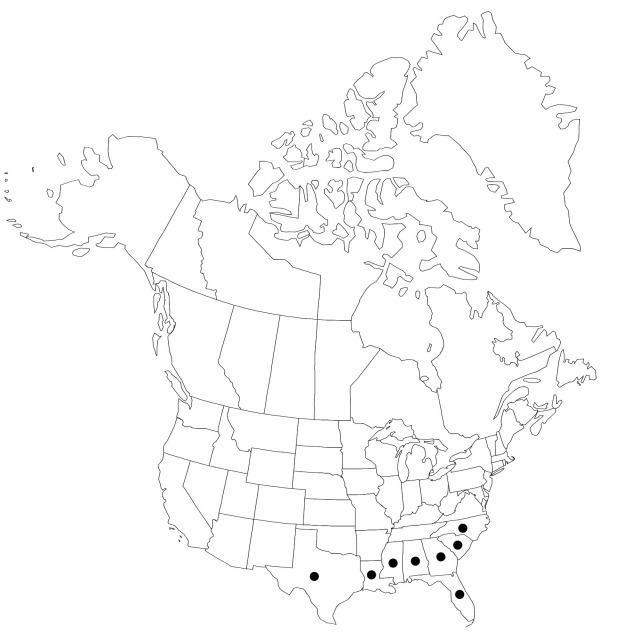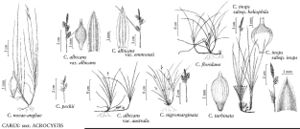Difference between revisions of "Carex floridana"
Ann. Lyceum Nat. Hist. New York 1: 66. 1824.
FNA>Volume Importer |
imported>Volume Importer |
||
| (3 intermediate revisions by 2 users not shown) | |||
| Line 6: | Line 6: | ||
|place=1: 66. 1824 | |place=1: 66. 1824 | ||
|year=1824 | |year=1824 | ||
| + | }} | ||
| + | |special_status={{Treatment/ID/Special_status | ||
| + | |code=F | ||
| + | |label=Illustrated | ||
| + | }}{{Treatment/ID/Special_status | ||
| + | |code=E | ||
| + | |label=Endemic | ||
}} | }} | ||
|basionyms= | |basionyms= | ||
| Line 11: | Line 18: | ||
|name=Carex nigromarginata var. floridana | |name=Carex nigromarginata var. floridana | ||
|authority=(Schweinitz) Kükenthal | |authority=(Schweinitz) Kükenthal | ||
| + | |rank=variety | ||
}} | }} | ||
|hierarchy=Cyperaceae;Carex;Carex sect. Acrocystis;Carex floridana | |hierarchy=Cyperaceae;Carex;Carex sect. Acrocystis;Carex floridana | ||
| Line 35: | Line 43: | ||
-->{{#Taxon: | -->{{#Taxon: | ||
name=Carex floridana | name=Carex floridana | ||
| − | |||
|authority=Schweinitz | |authority=Schweinitz | ||
|rank=species | |rank=species | ||
| Line 49: | Line 56: | ||
|publication title=Ann. Lyceum Nat. Hist. New York | |publication title=Ann. Lyceum Nat. Hist. New York | ||
|publication year=1824 | |publication year=1824 | ||
| − | |special status= | + | |special status=Illustrated;Endemic |
| − | |source xml=https:// | + | |source xml=https://bitbucket.org/aafc-mbb/fna-data-curation/src/2e0870ddd59836b60bcf96646a41e87ea5a5943a/coarse_grained_fna_xml/V23/V23_1024.xml |
|genus=Carex | |genus=Carex | ||
|section=Carex sect. Acrocystis | |section=Carex sect. Acrocystis | ||
Latest revision as of 20:38, 5 November 2020
Plants densely cespitose; rhizomes horizontally spreading to ascending, reddish brown, 17–75 mm, stout. Culms 5–17 cm, scabrous distally; bases (remnants of old leaves) weakly fibrous. Leaf blades green, occasionally glaucous, exceeding culms, 1.7–3 mm wide, herbaceous, papillose to scabrous abaxially, papillose to scabrous adaxially. Inflorescences with both staminate and pistillate spikes; peduncles of staminate spikes 0.3–1.2 mm; proximal cauline bracts leakflike, shorter than inflorescences. Spikes: proximal pistillate spikes 2–3 (basal spikes 0); cauline spikes overlapping, proximal 2 separated by less than 7 mm, with 4–8 perigynia; staminate spikes (3–)6.1–9.3 × 1.1–1.7 mm. Scales: pistillate scales pale to dark reddish brown, with narrow white margins, ovate to lanceolate, 2.7–4.2 × 1.2–2 mm, shorter than to equaling perigynia, apex acute to acuminate or short-aristate; staminate scales lanceolate, 2.8–4 × 1.2–1.8 mm, apex obtuse or acute to acuminate. Anthers 1.8–2 mm. Perigynia pale green, veinless, ellipsoid, 3–4.1 × 0.9–1.4 mm; beak straight, pale green, 0.6–0.9 mm, weakly ciliate-serrulate, apical teeth 0.1–0.3 mm. Stigmas 2(–3). Achenes brown, ellipsoid, biconvex, flattened-trigonous, or evenly trigonous with convex sides (all three types may occur on the same plant), 1.5–2 × 0.9–1.3 mm.
Phenology: Fruiting early Feb–late Apr.
Habitat: Dry, sandy loam or sand, in partial shade of mixed pine-hardwood forests or full sun along open roads and forest edges
Elevation: 0–200 m
Distribution

Ala., Fla., Ga., La., Miss., N.C., S.C., Tex.
Discussion
Carex floridana usually has been recognized as a distinct species in recent years; the distinctions from C. nigromarginata are subtle. To further complicate matters, some specimens are incomplete, lacking either complete bases or mature perigynia, rendering them unidentifiable. We have retained the two taxa at specific rank; further examination of their morphology, cytology, and ecology is warranted.
Selected References
None.
